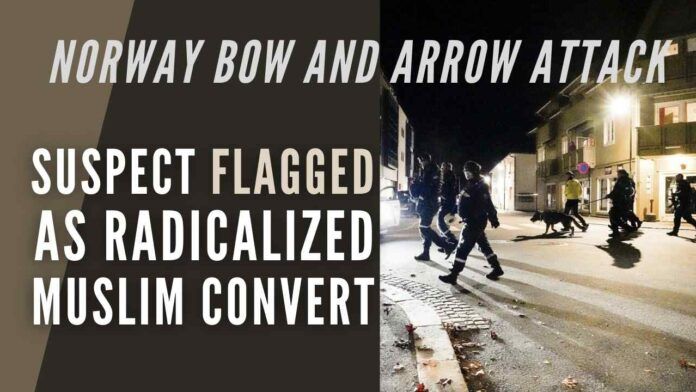
The Norway suspect attacker had recently converted to Islam
A 37-year-old Danish man whose name hasn’t been disclosed as yet launched a random attack in Norway with bows and arrows.
He began his attack at a supermarket in the town of Kongsberg on Wednesday with a bow and arrow – firing on locals and then on the officers who immediately arrived at the location.
Sadly, five people died and two were wounded in this dastardly attack.
The officers lost sight of the man when he hit them with a volley of arrows. After escaping, he managed to kill four women and one man before he was finally caught by the armed police.
They say he has converted to Islam and had been flagged for radicalism.
Earlier we have seen similar unfortunate instances that claimed several lives.
New Zealand police had shot a knife-wielding radical Islamist from Sri Lanka after he stabbed and wounded at least six people in a supermarket.
The gun rampage at a school in the city of Kazan, Russia also had an extremist mastermind behind it.
Unfortunately, there are several examples of radicalized Islamist violence in the recent past in which these conditions resulted in tragedy.
The dangerous confluence of reckless rhetoric, gun lobby influence, and armed extremism are dangerous to the entire world.
A strategy to cope with radical Islamic ideology cannot take shape without a reinterpretation of concepts of the boundaries of the freedom of religion and speech, definitions of religious incitement, and criminal culpability of religious leaders for the acts of their flock as a result of their influence.
The use of violent tactics such as bombing and assassinations for achieving perceived Islamic goals follow a very similar pattern worldwide.
The present transnational danger is Islamist terrorism. What is needed is a broad political-military strategy that rests on a firm tripod of policies to
- Attack terrorists and their organizations.
- Prevent the continued growth of Islamist terrorism.
- Protect against and prepare for terrorist attacks.
PGurus is now on Telegram. Click here to join our channel and stay updated with all the latest news and views
For all the latest updates, download PGurus App.
- PM Modi launches another scathing attack on Congress; says ‘Rajiv Gandhi scrapped inheritance law to save family property’ - April 25, 2024
- TN: ED questions five district collectors in illegal sand mining case - April 25, 2024
- ECI issues show cause notice over alleged MCC violations by PM Modi, Rahul Gandhi; seeks response from BJP, Congress chief - April 25, 2024










